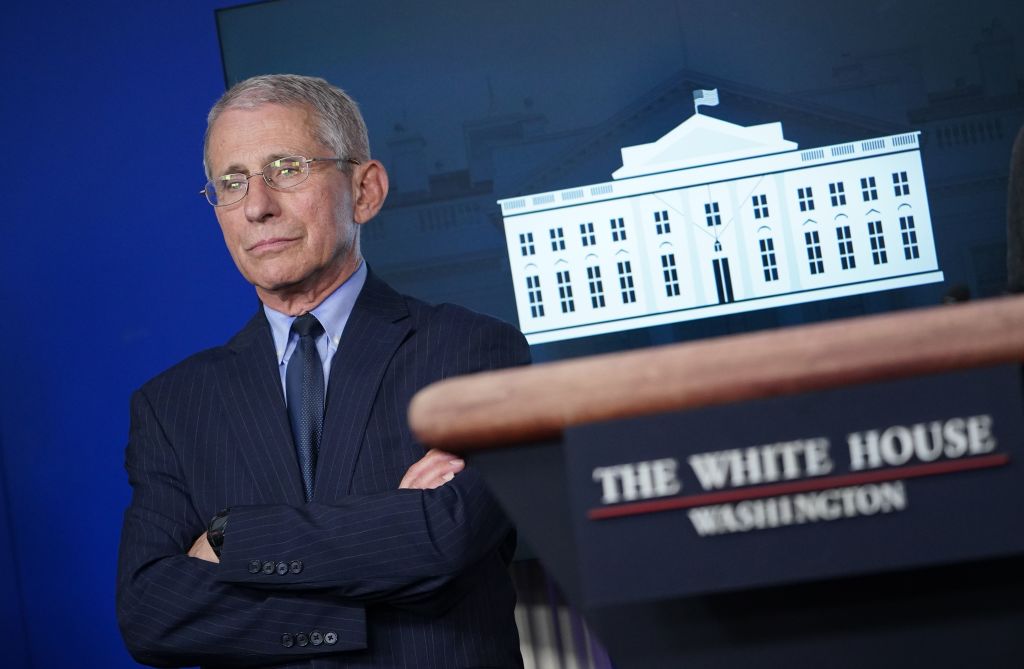Fauci gets honest about the 'surrealistic experience' of working for Trump


A free daily email with the biggest news stories of the day – and the best features from TheWeek.com
You are now subscribed
Your newsletter sign-up was successful
Dr. Anthony Fauci is continuing to look back — and get brutally honest — about his experience working under former President Donald Trump.
Fauci, director of the National Institute of Allergy and Infectious Diseases, opened up about the Trump administration in a new interview with The Atlantic, recalling how the White House "became a different place" where officials broke from previous administrations' "deep respect for science," making for a "surrealistic experience."
For instance, Fauci recalled his frustration over Trump hearing things about the COVID-19 pandemic from random people like "a buddy he knew from somewhere" and taking it as seriously as what the experts were saying, as well as surrounding himself with "strange people" promoting "garbage" science. He also said Trump showed an apparent lack of interest in the pandemic.
The Week
Escape your echo chamber. Get the facts behind the news, plus analysis from multiple perspectives.

Sign up for The Week's Free Newsletters
From our morning news briefing to a weekly Good News Newsletter, get the best of The Week delivered directly to your inbox.
From our morning news briefing to a weekly Good News Newsletter, get the best of The Week delivered directly to your inbox.
"It's really tough to get into his head, but I think what was going on with him is he was not interested in the outbreak," Fauci said. "The outbreak to him was an inconvenient truth that he didn't accept as a truth."
Fauci remembers making administration officials "furious" by contradicting Trump's "nonsense," and at one point, the White House even sent out a list of things he allegedly got wrong about the pandemic that "was complete crap." In the end, Fauci said he tried not to let things like this bother him.
"People's lives are at stake," Fauci said. "I'm a physician. I'm a scientist. I'm a public-health expert. I know what I need to do. All that other stuff is just a distraction. Quite frankly, it's bulls--t."
At the same time, Fauci said he and Trump actually "really liked each other," and the president was "charismatic and likable on a personal basis," if "not on a policy basis." But with President Biden in office, Fauci said, it's as if "we went from an alternative world into a real world." Read the full interview at The Atlantic.
A free daily email with the biggest news stories of the day – and the best features from TheWeek.com
Brendan worked as a culture writer at The Week from 2018 to 2023, covering the entertainment industry, including film reviews, television recaps, awards season, the box office, major movie franchises and Hollywood gossip. He has written about film and television for outlets including Bloody Disgusting, Showbiz Cheat Sheet, Heavy and The Celebrity Cafe.
-
 Key Bangladesh election returns old guard to power
Key Bangladesh election returns old guard to powerSpeed Read The Bangladesh Nationalist Party claimed a decisive victory
-
 Judge blocks Hegseth from punishing Kelly over video
Judge blocks Hegseth from punishing Kelly over videoSpeed Read Defense Secretary Pete Hegseth pushed for the senator to be demoted over a video in which he reminds military officials they should refuse illegal orders
-
 Trump’s EPA kills legal basis for federal climate policy
Trump’s EPA kills legal basis for federal climate policySpeed Read The government’s authority to regulate several planet-warming pollutants has been repealed
-
 Key Bangladesh election returns old guard to power
Key Bangladesh election returns old guard to powerSpeed Read The Bangladesh Nationalist Party claimed a decisive victory
-
 Epstein files topple law CEO, roil UK government
Epstein files topple law CEO, roil UK governmentSpeed Read Peter Mandelson, Britain’s former ambassador to the US, is caught up in the scandal
-
 Iran and US prepare to meet after skirmishes
Iran and US prepare to meet after skirmishesSpeed Read The incident comes amid heightened tensions in the Middle East
-
 EU and India clinch trade pact amid US tariff war
EU and India clinch trade pact amid US tariff warSpeed Read The agreement will slash tariffs on most goods over the next decade
-
 Israel retrieves final hostage’s body from Gaza
Israel retrieves final hostage’s body from GazaSpeed Read The 24-year-old police officer was killed during the initial Hamas attack
-
 China’s Xi targets top general in growing purge
China’s Xi targets top general in growing purgeSpeed Read Zhang Youxia is being investigated over ‘grave violations’ of the law
-
 Panama and Canada are negotiating over a crucial copper mine
Panama and Canada are negotiating over a crucial copper mineIn the Spotlight Panama is set to make a final decision on the mine this summer
-
 Why Greenland’s natural resources are nearly impossible to mine
Why Greenland’s natural resources are nearly impossible to mineThe Explainer The country’s natural landscape makes the task extremely difficult
